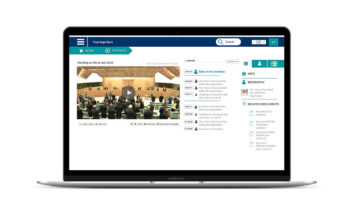
5-Minute Interview
Mario Maltese, CEO, Audio Visual Resources Inc., an AV design-build and systems testing company based in Williston Park, NY. Maltese recently released his book ?AV 9000: Defining Quality in Engineered Audio Visual Systems.? He’s also a senior faculty member of the InfoComm International Academy, the Fairfax, VA-based professional AV industry association’s educational arm.
Mario Maltese, CEO, Audio Visual Resources Inc., an AV design-build and systems testing company based in Williston Park, NY. Maltese recently released his book “AV 9000: Defining Quality in Engineered Audio Visual Systems.” He’s also a senior faculty member of the InfoComm International Academy, the Fairfax, VA-based professional AV industry association’s educational arm.
Pro AV:Why do you feel the time is right to define quality standards for the AV industry?
Maltese: Quality in the industry has been eroding, and consumers are voting with their feet. I’ve been instructing at the InfoComm Academy for Design for several years now, and more and more I see the makeup of the class shifting toward end-users. When I speak to my customers, I ask them about why they’re taking this on instead of hiring a consultant and an integrator. They say that the quality has suffered so much that they feel they can do a better job themselves. In addition to that, the manufacturers have long been lamenting the lack of quality of the people putting the systems in, as well as choosing and properly applying the systems. The manufacturers’ design approach appears to be to make the systems as easy as possible, which requires very little technical expertise. The customers are getting more sophisticated, and the technology has diverged.
Pro AV:Are integrators failing to recognize the real end-users?
Maltese: It’s not just integrators — our entire industry is confused about this. The provider is actually several interdependent entities. It’s the architect doing his thing, the designer doing his thing, and the contractor doing his thing. A contractor would have never even come on board if the consultant wasn’t onboard first. Just on the integrator side, I can understand where it’s confusing. The integrator got a bid package from the customer, but the only reason he made it on the bid list is because the consultant put him there. So to the integrator, it looks as though his customer may be the consultant, but that isn’t the case. The ones paying everyone’s lunch are the people who use the systems in a room.
Pro AV:IT and electrical contractors have established quality standards and are beginning to migrate into AV. Do you think an AV 9000 quality standard will help protect AV professionals from losing jobs to these industries?
altese: Anything having to do with quality will help. The focus has to be on quality and keeping the customer satisfied. Whoever does that will be around continuing to sell their services. Those who don’t will be replaced. Eighty percent of dissatisfied customers never complain — they just vote with their feet.
Pro AV:You’ve said that your company is operating at 27 percent net profit. What’s the average across the industry? How will an establishment and adherence to a quality standard impact that profitability?
Maltese: According to the Robert Morris ratios, which is an accounting firm that looks at the different standard industry codes, reporting, and taxes, those companies that are making a profit show a 2 percent net profit. And depending on what part of the business cycle they’re in, many of them don’t show profit at all. Quality is all about profits. You can either increase sales or decrease costs, but with either approach you run the risk of failing to keep your customers satisfied. That will happen if you overextend your sales or cut your costs to the point where you aren’t providing what you said you’d provide. But if you focus on quality, you’ll keep your customers happy, and they’ll become your best salespeople.









